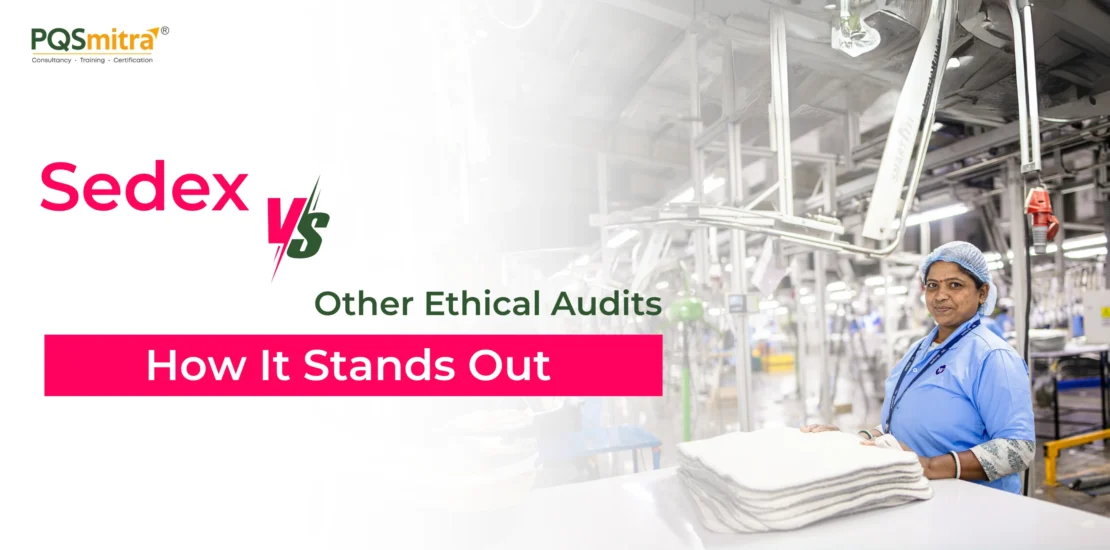SEDEX vs. Other Ethical Audits: What Makes It Stand Out?
- April 7, 2025
- Posted by: PQS_Mitra_Main_Access
- Category: SEDEX Audit

In today’s world, businesses are under increasing pressure to ensure their supply chains are ethical, responsible, and sustainable. From consumers to stakeholders, everyone wants to know that the products they buy or invest in come from sources that treat workers fairly, follow environmental standards, and uphold ethical business practices. To meet these expectations, companies rely on ethical audits—but not all audits are the same.
One of the most widely recognized ethical audit platforms are SEDEX (Supplier Ethical Data Exchange), and its audit methodology, SMETA (Sedex Members Ethical Trade Audit). But how does it compare to other ethical audits like SA8000, BSCI, WRAP, and Fair Trade? Let’s break it down in simple terms.
What is SEDEX and SMETA?
First, let’s clear up a common confusion: SEDEX is not an audit itself. Instead, it is an online platform that allows businesses to share ethical audit reports with their buyers, suppliers, and stakeholders. This reduces the need for multiple audits by different customers and makes supply chains more transparent.
The actual audit process used under SEDEX is called SMETA (Sedex Members Ethical Trade Audit). SMETA is one of the most commonly used ethical audits worldwide and covers four key areas:
Labor Standards – Ensuring fair wages, safe working conditions, and no forced or child labor.
Health & Safety – Checking if the workplace is safe for workers.
Environmental Assessment – Evaluating how businesses impact the environment.
Business Ethics – Ensuring fair business practices and compliance with anti-bribery laws.
The best part? SEDEX allows businesses to share these audit results with multiple customers, avoiding repeated audits and reducing costs.
How SEDEX Differs from Other Ethical Audits?
There are many ethical audits out there, but they all have different approaches. Here’s a quick comparison:
|
Feature |
SEDEX (SMETA) |
SA8000 |
BSCI |
WRAP |
Fair Trade |
|
What it does |
Shares ethical audit results |
Social accountability certification |
Monitors labor rights |
Certifies factories in apparel & footwear |
Ensures fair trade & sustainable sourcing |
|
Who owns it? |
SEDEX (membership-based) |
SAAS (certification-based) |
BSCI initiative |
WRAP certification |
Fair Trade Organization |
|
Industry focus |
Any industry |
Any industry |
Mainly European businesses |
Apparel & manufacturing |
Agriculture, handicrafts |
|
Certification? |
No certification, just audit sharing |
Certification required |
No certification, just monitoring |
Certification-based |
Certification-based |
The biggest difference? SEDEX does not provide a certification, but instead acts as a platform where businesses can share their audit results with multiple clients—saving time and effort. This is unlike SA8000, WRAP, and Fair Trade, which provide direct certification.
Why SEDEX Stands Out?
So, what makes SEDEX different from other audits? Here are some key reasons:
- Transparency and Data Sharing
Unlike most ethical audits that only provide a certification, SEDEX allows businesses to share their audit results with multiple clients. This reduces the need for repeated audits, saving businesses both time and money.
- Covers Multiple Industries
While audits like WRAP focus on apparel and Fair Trade focuses on agriculture, SEDEX can be used in any industry, making it a versatile option for companies with diverse supply chains.
- Flexible and Customizable
Most ethical audits have fixed certification requirements, but SEDEX is more flexible. Companies can choose compliance models based on what their customers require, making it easier to meet different expectations.
- Collaboration, Not Just Compliance
SEDEX is not just about passing an audit—it’s about continuous improvement. It encourages businesses to collaborate and improve working conditions rather than just getting a certification and moving on.
How PQSmitra Can Help?
If you’re looking to implement SEDEX compliance in your business, PQSmitra is here to help. As experts in ethical compliance, PQSmitra can guide you through the entire process—from preparing for a SMETA audit to improving your ethical trade practices. Whether you need assistance with documentation, compliance strategies, or audit readiness, PQSmitra ensures that your business meets global ethical standards while making the process smooth and hassle-free.
Conclusion
In a world where ethical business practices matter more than ever, SEDEX offers a practical and transparent approach to supply chain compliance. While it doesn’t provide a direct certification like SA8000 or WRAP, it makes ethical auditing simpler, more cost-effective, and widely accepted across industries.
If your business wants to enhance ethical trade practices without undergoing multiple audits, SEDEX might be the perfect solution. And with PQSmitra by your side, navigating the process becomes effortless!
Leave a Reply Cancel reply
Kindly submit a business inquiry online and we will get back to you!
OR
Call us on 022-2893 8687 | +91-9820204373
